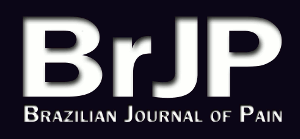HIGHLIGHTS
-
When compared to undergraduates, Physiotherapists present greater knowledge about pain neurophysiology and self-perception of skills to assist individuals with pain.
-
The low score of the Neurophysiological Pain Questionnaire suggests that curricular implementation of pain-oriented subjects is needed in undergraduate physiotherapy education.
-
Specific training on pain should be carried out to increase the level of knowledge and skills of physiotherapists in the treatment of individuals with pain.
ABSTRACT
BACKGROUND AND OBJECTIVES:
Approaches to coping with pain, such as patient education, are directly related to the professionals’ skill level. The identification of possible learning gaps in the different stages of training can contribute to the development of new teaching strategies and methods. This study aimed to evaluate and compare the level of knowledge about the neurophysiology of pain and the self-perception of abilities to care for individuals with pain in undergraduate and graduate students in physiotherapy in Brazil.
METHODS:
This is a cross-sectional analytical observational study, in which the Neurophysiological Pain Questionnaire (QND) was applied to assess the level of knowledge about the neurophysiology of pain. A self-administered questionnaire was also used to collect sociodemographic data from the sample and to assess self-perception of abilities to care for individuals with pain. The characteristics of the study population were defined by descriptive statistics. For the analysis of QND score distribution and self-perception of abilities to care for individuals with pain, the Shapiro-Wilk test was used. In the bivariate analysis to compare the distribution of the QND score and self-perception of abilities to care for individuals with pain between the stages of undergraduates and schooling after graduation, the Kruskal-Wallis test was used, with a significance level of 5% and 95% confidence interval. The statement Strengthening the Reporting of Observational Studies in Epidemiology (STROBE) was used as a guide for reporting the results of the study.
RESULTS:
A total of 306 volunteers participated in the study, 208 undergraduate students (22.3 ± 3.2 years) and 98 physiotherapists (31.7± 8.7 years). The average QND score for undergraduate students was 6.17 and 8.56 for physiotherapists, considering a total of 12 points. There was a significantly higher difference in the scores obtained on the QND by undergraduates in the intermediate phase and in the last year (p<0.05), as well as in the self-perception of abilities to care for individuals with pain and perform a biopsychosocial approach to the patient, between the different phases of the course. However, among physiotherapists, no significant difference was observed in the total QND score, and in the self-perception of abilities to care for individuals with pain.
CONCLUSION:
The findings of this study suggest that the level of knowledge about the neurophysiology of pain and self-perception of skills to care for individuals with pain differs between academics and physiotherapy professionals. However, the low QND score of physiotherapy undergraduates, as well as the absence of significant differences in the QND between the different levels of physiotherapist training, suggest that curricular implementation and specific training on pain may be indispensable to increase the level of knowledge and skills of physiotherapists in the treatment of individuals with pain.
Keywords
Health knowledge; Pain; Neurophysiology; Physiotherapy

 Thumbnail
Thumbnail
 Thumbnail
Thumbnail
 Thumbnail
Thumbnail
 Thumbnail
Thumbnail



